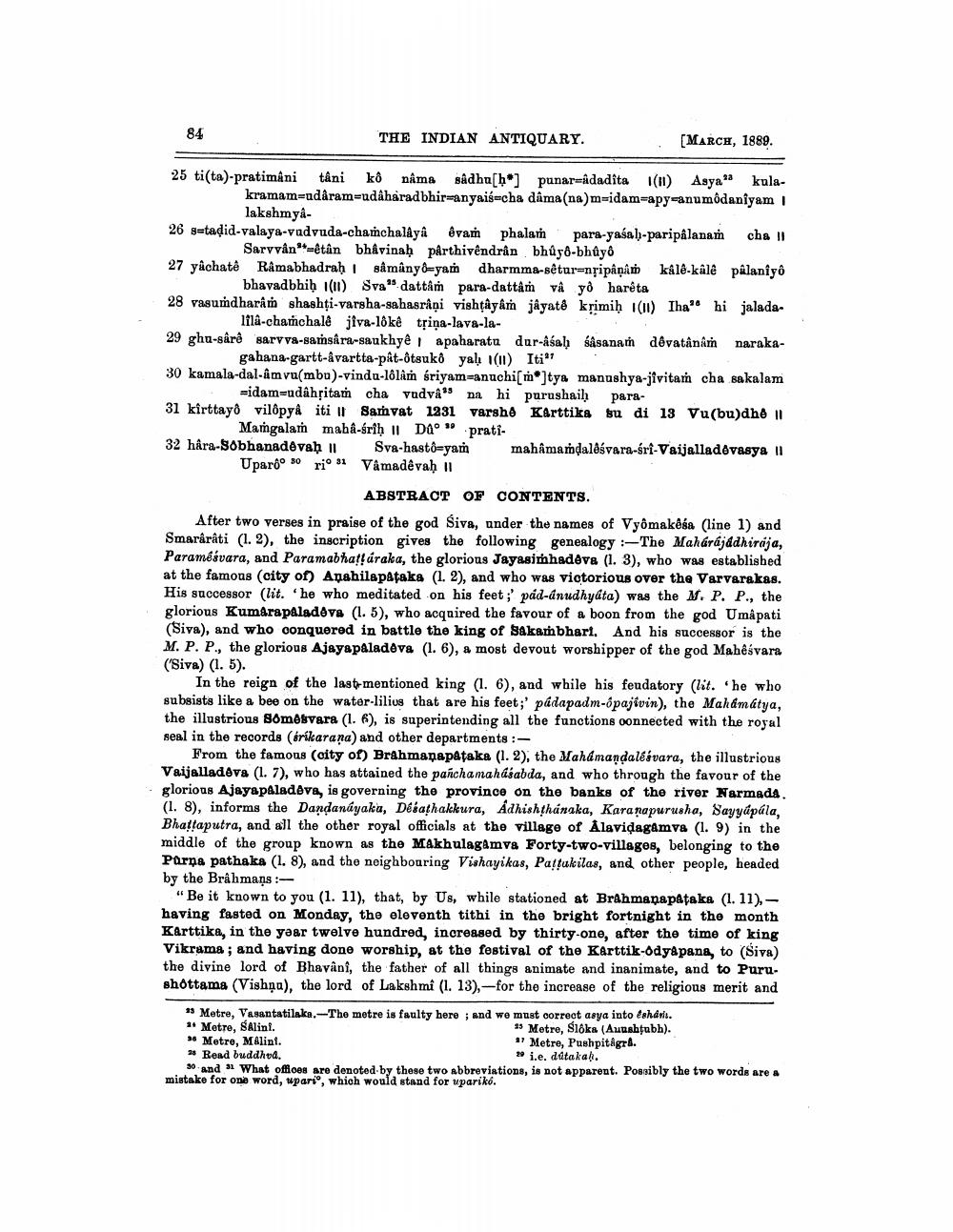________________
THE INDIAN ANTIQUARY.
[MARCH, 1889
25 ti(ta)-pratimini tâni k náms sådhu[bo] punarmidadîta (11) Asya o kula
kramam-adâram-udáharadbhirwanyaischa dama (na)m=idam-apy-anumôdaniyam
lakshmya26 s=tadid-valaya-vadvuda-chanchalâyâ êvaṁ phala para-yasah-paripälanaṁ cha 1
Sarvvân"-êtân bhävinaḥ pârthivêndran bhůy8-bhûyê 27 yâchaté Råmabhadrah sâmány =yam dharmma-sêturænfipâņam kald-kâle pålaniyo
bhavadbhih (11) Sva" dattâm para-dattám và yê haréta 28 yasumdharam shashți-varsha-sahasråņi vishțâyám jáyatě krimiḥ (11) Iha" hi jalada
lila-chamchalê jiva-lôké třiņa-lava-la29 ghu-sârê sarvva-samsara-saukhye apaharata dur-asah sisanat dévatanan naraka
gahana-gartt-åvartta-pât-otsuk yah 1(11) Iti" 30 kamala-dal-amvu(mbu)-vindu-lolam sriyam=anuchi(m®]tya manushya-jivita cha sakalam
widam-udâhritam cha vudva" na hi purushail para31 kirttayo vilôpya iti | Samvat 1231 varshe Karttika su di 13 Vu(bu)dhe 11
Mamgalam mahd-srih || Dao * prati32 hâra-Sobhanadevaḥ | Sva-hastô=ya m ahậmandalesvara-sri-Vaijalladévasya 11 Uparôo 30 rio 31 Vámadêvah !!
ABSTRACT OF CONTENTS. After two verses in praise of the god Siva, under the names of Vyômakåsa (line 1) and Smarârâti (1.2), the inscription gives the following genealogy - The Maharajadhiraja, Paraméśvara, and Paramabhattáraka, the glorious Jayasimhadeva (1. 3), who was established at the famous (city of) Apahilapataka (1.2), and who was victorious over the Varvarakas. His successor (lit. he who meditated on his feet;' pád-anudhyáta) was the M. P. P., the glorious Kumarapaladeva (1. 5), who acquired the favour of a boon from the god Umapati (Siva), and who conquered in battle the king of Sakambhari. And his successor is the M. P. P., the glorious Ajayapaladeva (1. 6), a most devout worshipper of the god Mahêśvara ('Siva) (1.5).
In the reign of the last mentioned king (1. 6), and while his feudatory (lit. he who subsists like a bee on the water-lilius that are his feet;' padapadm-ópajivin), the Mahámátya, the illustrious som svara (1. 6), is superintending all the functions oonnected with the royal seal in the records (sríkarana) and other departments :
From the famous (city of) Brahmanapataka (1.2), the Mahamandalésvara, the illustrious Vaijalladeva (1. 7), who has attained the panchamahásabda, and who through the favour of the glorious Ajayapaladeva, is governing the province on the banks of the river Narmada (1. 8), informs the Dandanáyaka, Débathakkura, Adhishthanaka, Karanapurusha, Sayyúpála, Bhattaputra, and all the other royal officials at the village of Alavidag&mva (1.9) in the middle of the group known as the Makhulagámvs Forty-two-villages, belonging to the Parna pathaka (1. 8), and the neighbouring Vishayikas, Pattukilas, and other people, headed by the Brahmans :
"Be it known to you (1. 11), that, by Us, while stationed at Brahmanapataka (1. 11), - having fasted on Monday, the eleventh tithi in the bright fortnight in the month Karttika, in the yaar twelve hundred, increased by thirty-one, after the time of king Vikrama; and having done worship, at the festival of the Karttik-ody&pana, to (Siva) the divine lord of Bhavani, the father of all things animate and inanimate, and to Purushottama (Vishņa), the lord of Lakshmi (1. 13),- for the increase of the religious merit and
» Metre, Vasantatilaka.-The metre is faulty here, and we must correct asya into eshdrio. 14 Metre, Salini.
95 Metre, Sloka (Augshubh). » Metre, Malini.
"Metre, Pushpitágra. ** Read buddhud.
i.e. ddtakak. 30 and 1 What offices are denoted by these two abbreviations, is not apparent. Possibly the two words are a mistake for one word, wpari, which would stand for uparikó.




